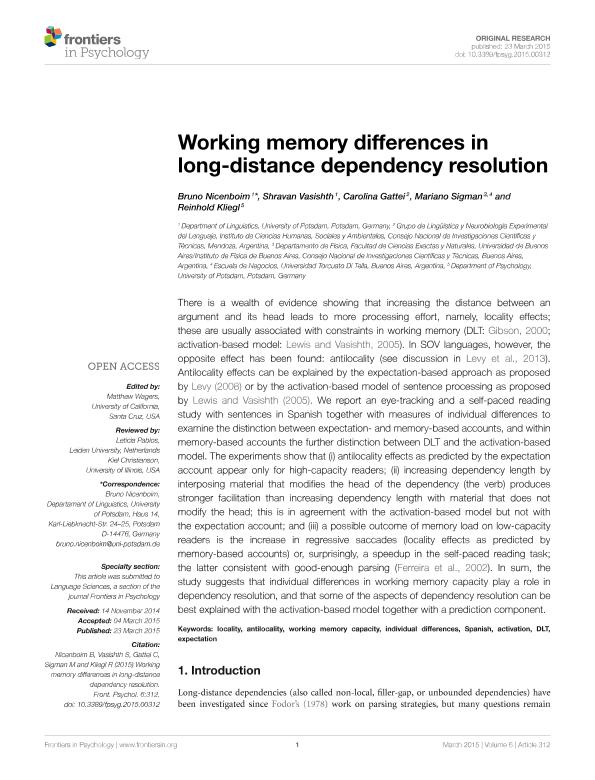Mostrar el registro sencillo del ítem
dc.contributor.author
Nicenboim, Bruno
dc.contributor.author
Shravan, Vasishth
dc.contributor.author
Gattei, Carolina Andrea

dc.contributor.author
Sigman, Mariano

dc.contributor.author
Reinhold, Kliegl
dc.date.available
2018-05-30T17:22:38Z
dc.date.issued
2015-03
dc.identifier.citation
Nicenboim, Bruno; Shravan, Vasishth; Gattei, Carolina Andrea; Sigman, Mariano; Reinhold, Kliegl; Working memory differences in long-distance dependency resolution; Frontiers Research Foundation; Frontiers in Psychology; 6; 312; 3-2015; 1-16
dc.identifier.uri
http://hdl.handle.net/11336/46651
dc.description.abstract
There is a wealth of evidence showing that increasing the distance between an argument and its head leads to more processing effort, namely, locality effects; these are usually associated with constraints in working memory (DLT: Gibson, 2000; activation-based model: Lewis and Vasishth, 2005). In SOV languages, however, the opposite effect has been found: antilocality (see discussion in Levy et al., 2013). Antilocality effects can be explained by the expectation-based approach as proposed by Levy (2008) or by the activation-based model of sentence processing as proposed by Lewis and Vasishth (2005). We report an eye-tracking and a self-paced reading study with sentences in Spanish together with measures of individual differences to examine the distinction between expectation- and memory-based accounts, and within memory-based accounts the further distinction between DLT and the activation-based model. The experiments show that (i) antilocality effects as predicted by the expectation account appear only for high-capacity readers; (ii) increasing dependency length by interposing material that modifies the head of the dependency (the verb) produces stronger facilitation than increasing dependency length with material that does not modify the head; this is in agreement with the activation-based model but not with the expectation account; and (iii) a possible outcome of memory load on low-capacity readers is the increase in regressive saccades (locality effects as predicted by memory-based accounts) or, surprisingly, a speedup in the self-paced reading task; the latter consistent with good-enough parsing (Ferreira et al., 2002). In sum, the study suggests that individual differences in working memory capacity play a role in dependency resolution, and that some of the aspects of dependency resolution can be best explained with the activation-based model together with a prediction component.
dc.format
application/pdf
dc.language.iso
eng
dc.publisher
Frontiers Research Foundation

dc.rights
info:eu-repo/semantics/openAccess
dc.rights.uri
https://creativecommons.org/licenses/by/2.5/ar/
dc.subject
Locality
dc.subject
Antilocality
dc.subject
Working Memory Capacity
dc.subject
Individual Differences
dc.subject
Spanish
dc.subject
Activation
dc.subject
Dlt
dc.subject
Expectation
dc.subject.classification
Estudios Generales del Lenguaje

dc.subject.classification
Lengua y Literatura

dc.subject.classification
HUMANIDADES

dc.title
Working memory differences in long-distance dependency resolution
dc.type
info:eu-repo/semantics/article
dc.type
info:ar-repo/semantics/artículo
dc.type
info:eu-repo/semantics/publishedVersion
dc.date.updated
2018-04-27T18:51:17Z
dc.identifier.eissn
1664-1078
dc.journal.volume
6
dc.journal.number
312
dc.journal.pagination
1-16
dc.journal.pais
Suiza

dc.journal.ciudad
Lausana
dc.description.fil
Fil: Nicenboim, Bruno. Universitat Potsdam; Alemania
dc.description.fil
Fil: Shravan, Vasishth. Universitat Potsdam; Alemania. University of Sheffield; Reino Unido
dc.description.fil
Fil: Gattei, Carolina Andrea. Consejo Nacional de Investigaciones Científicas y Técnicas. Centro Científico Tecnológico Conicet - Mendoza. Instituto de Ciencias Humanas, Sociales y Ambientales; Argentina. Universidad Torcuato Di Tella. Escuela de Negocios; Argentina
dc.description.fil
Fil: Sigman, Mariano. Consejo Nacional de Investigaciones Científicas y Técnicas. Oficina de Coordinación Administrativa Ciudad Universitaria. Instituto de Física de Buenos Aires. Universidad de Buenos Aires. Facultad de Ciencias Exactas y Naturales. Instituto de Física de Buenos Aires; Argentina. Universidad Torcuato Di Tella. Escuela de Negocios; Argentina
dc.description.fil
Fil: Reinhold, Kliegl. Universitat Potsdam; Alemania
dc.journal.title
Frontiers in Psychology
dc.relation.alternativeid
info:eu-repo/semantics/altIdentifier/url/https://www.frontiersin.org/articles/10.3389/fpsyg.2015.00312/full
dc.relation.alternativeid
info:eu-repo/semantics/altIdentifier/doi/http://dx.doi.org/10.3389/fpsyg.2015.00312
dc.relation.alternativeid
info:eu-repo/semantics/altIdentifier/url/https://www.ncbi.nlm.nih.gov/pmc/articles/PMC4369666/
Archivos asociados
